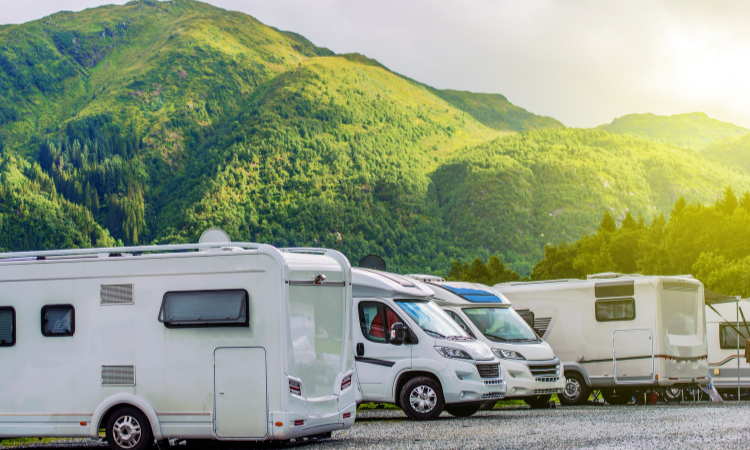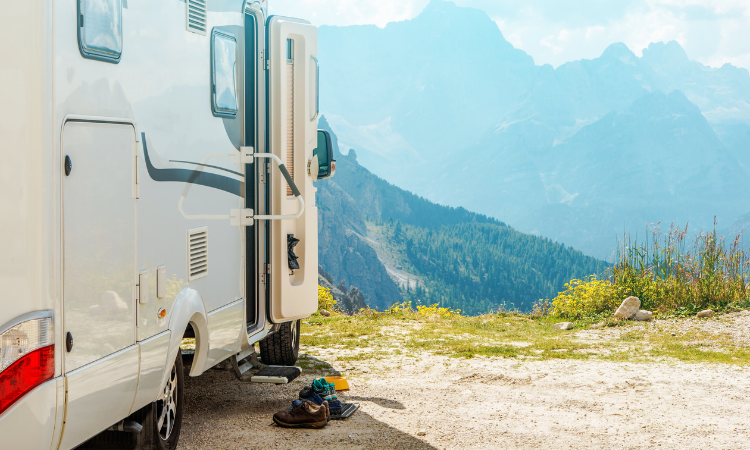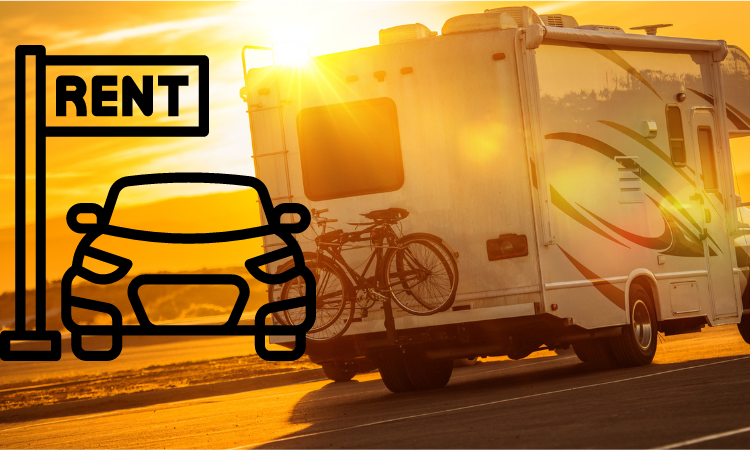Best Gas Mileage For RV [2023]
Which RVs Have the Best Fuel Economy – Petrol or Diesel?
Many people are drawn to the idea of traveling in an RV, and exploring the open road.
Whether you’re a seasoned RVer, a weekend traveler, or someone dreaming of your first RV adventure, one of the biggest choices you’ll make is picking between a gasoline or diesel motorhome.
You should choose diesel over petrol in your motorhome for improved fuel economy. Generally, diesel engines offer 10% to 15% better mileage and provide more energy, increasing efficiency.
This power generation efficiency can significantly impact your RVing journey, from the overall cost of ownership to fuel efficiency and performance.
In this extensive guide, we will explore the pros and cons of both options, providing you with the knowledge needed to make an informed decision tailored to your specific needs and preferences.
Petrol vs. Diesel Motorhomes: What’s Right for Me?
When you compare diesel and gasoline motorhomes, you’ll find that diesel motorhomes are better at saving fuel. Diesel fuel has more energy than gasoline, like a supercharged battery.
Because of this, diesel engines can make the RV go about 10 percent farther on the same amount of fuel compared to gasoline engines.
Lots of people asked how. Here’s why it happens: Diesel engines squeeze air really well before they add the fuel, like squishing a balloon.
This makes the engine work better and use less fuel.
So, if you want your RV to go farther on a tank of petrol choose a diesel motorhome is a smart idea.
It’s not only good for your wallet but also for the environment because it uses fuel more efficiently.
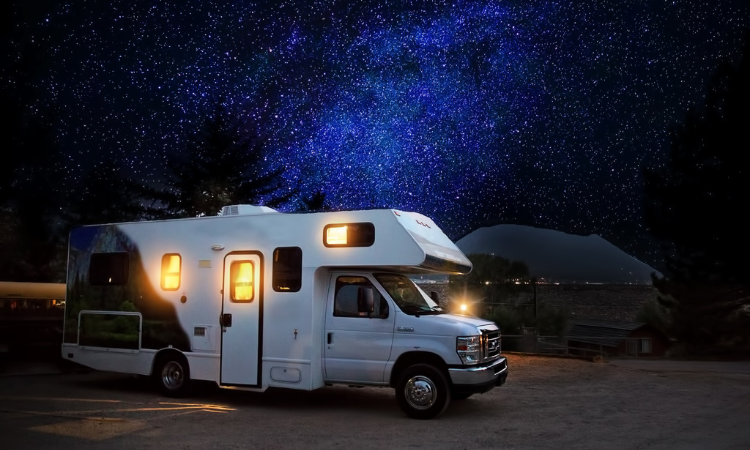
Types of RVs:
RVs, which stand for recreational vehicles, are like homes on wheels that come in all shapes and sizes. They make traveling super comfy and fun.
There are three main types of RVs: Class A, Class B, and Class C. Here is a preview of these types-
| Type of RV (Motorhomes)
|
Description |
|
Class A
|
Often called “bus-style” RVs, offer the largest and most luxurious living spaces, including full kitchens, multiple bedrooms, spacious bathrooms, and sometimes washer/dryer units.
|
|
Class B
|
Known as camper vans, are compact and nimble, suitable for navigating tight spaces, and can double as a practical second vehicle.
|
|
Class C
|
Class C motorhomes bridge the gap between A and B, with a distinctive cab-over section for extra sleeping space or storage, making them practical for families and comfort-seekers.
|
What Factors Should You Consider When Choosing Petrol and Diesel Motorhomes?
Both diesel and petrol motorhomes have their own advantages and disadvantages, but they both have features that make them attractive to buyers. Here are some of the most important factors-
1. Price Difference
When you’re picking between petrol and diesel motorhomes, it’s important to think about how much money you have to spend.
Petrol motorhomes usually cost less when you first buy them. This might seem good if you want to save money right away. But, remember to think about the future.
Diesel motorhomes can be better in the long run because they save on fuel and last longer.
So, before you choose, think about your budget now and in the future. It’s not just about what you pay upfront, it’s about how much you’ll save over time.
2. Maintenance Cost
It’s a significant factor to weigh when choosing between petrol and diesel motorhomes.
Petrol engines are generally easier and less expensive to maintain. Diesel engines, on the other hand, can be more complex and costly to repair if something goes wrong.
Routine service and repairs are often simpler in petrol engines but are frequently needed.
In a diesel engine, it may not require frequent repairs but if needed it will cost more than a petrol engine.
Therefore, if you appreciate easy and budget-friendly maintenance, gasoline motorhomes may be the better fit for you.
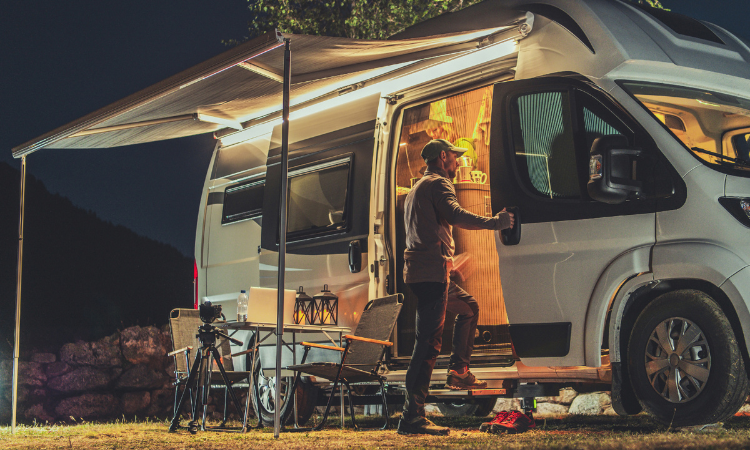
3. Fuel Efficiency
Fuel efficiency is a key consideration in the petrol vs. diesel motorhome debate.
Diesel motorhomes are renowned for their superior fuel efficiency compared to their petrol counterparts.
They can travel more miles on the same amount of fuel, potentially saving you money on your adventures. If you prioritize fuel savings and are concerned about the environment, diesel might be the better choice.
However, keep in mind that diesel motorhomes often come with a higher upfront cost, so you’ll need to weigh these long-term savings against the initial investment.
4. Engine Longevity
In general, a motorhome usually lasts around 20 years or until it reaches 200,000 miles, whichever comes first.
However, diesel engines tend to last longer than petrol engines.
If you plan to tackle numerous long journeys and put many miles on your RV, a diesel motorhome may be the smarter choice.
Its durability means it can handle the rigors of extensive travel better, potentially reducing your long-term ownership costs.
On the other hand, if you’re not planning extensive, cross-country trips, a gasoline motorhome might be suitable, as they still offer reliability for less demanding travel.
5. Driving Experience
Your drive can feel different based on whether you pick a petrol or diesel motorhome. Petrol ones are usually smoother and quieter, making driving comfy.
They’re great for beginners because they’re easy to handle.
On the other hand, diesel motorhomes are more powerful and have extra pulling strength (torque). This helps a lot when you’re going through tough spots like hilly areas or steep hills.
If you anticipate traversing such conditions frequently, a diesel motorhome’s additional muscle may provide added confidence behind the wheel.
Therefore, consider your intended travel destinations and road conditions when making your choice.
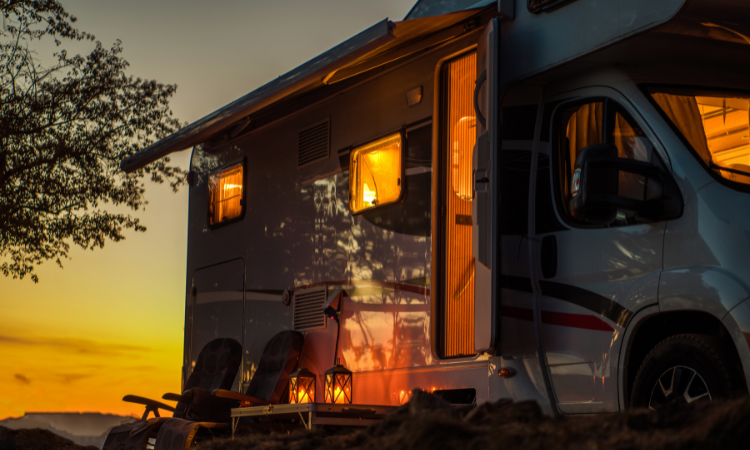
6. Weight Capacity
Diesel motorhomes typically have a higher weight capacity, allowing them to carry more people and gear. The load-carrying capacity of a diesel chassis motorhome can range from 22,000 to almost 60,000 pounds.
This added capacity can be crucial if you have a large family or plan to bring along a significant amount of equipment or supplies.
Petrol motorhomes, while still offering adequate weight capacity for most travelers, may have limitations when it comes to carrying extensive cargo.
So, assess your carrying needs carefully to ensure your RV can accommodate everything comfortably.
7. Brakes
Brakes are a vital safety consideration when choosing between petroland diesel motorhomes.
Some diesel motorhomes come equipped with air brakes, which offer superior stopping power compared to the hydraulic brakes commonly found in gasoline RVs.
Air brakes provide enhanced safety, especially when driving a large and heavy vehicle.
So, if safety is a top priority for you, especially on hilly or mountainous terrain, a diesel motorhome with air brakes may be the preferred choice.
8. Resale Value
Resale value is an essential aspect to consider if you ever plan to sell or trade your RV. Diesel motorhomes tend to retain their value better than petrol models.
This means that if you decide to part with your RV in the future, you’re more likely to get a higher price for it, making it a sound long-term investment.
Petrol motorhomes, while still valuable, may not hold their value as well. So, if you’re thinking about your RV’s future resale potential, diesel might be the wiser choice.
Advantages and disadvantages of Petrol or Diesel
Petrol Motorhomes:
Pros:
- Lower upfront cost, making them more budget-friendly.
- Easier and less expensive maintenance.
- Smoother and quieter operation, resulting in a comfortable ride.
- Suitable for beginners due to their user-friendly nature.
Cons:
- Lower fuel efficiency, potentially leading to higher long-term fuel costs.
- Shorter engine longevity compared to diesel counterparts.
- Limited towing capacity for heavier loads.
Diesel Motorhomes:
Pros:
- Superior fuel efficiency, translating to significant fuel savings on long journeys.
- Long-lasting engines, often exceeding the lifespan of gasoline engines.
- High torque, making them ideal for towing heavy loads.
- Excellent resale value, which can make them a sound long-term investment.
Cons:
- Higher upfront cost, requiring a larger initial investment.
- More complex and expensive maintenance.
- Emissions systems such as DEF add to operational costs.
Frequently Asked Questions:
Which is better for long-distance travel, petrol, or diesel motorhomes?
Diesel motorhomes are generally preferred for long-distance travel due to their better fuel efficiency and engine longevity. They are built to withstand the demands of extended journeys.
Are diesel motorhomes harder to drive than petrol ones?
Diesel motorhomes may have a steeper learning curve due to their size and power. However, they often offer a more powerful and confident driving experience, especially on challenging terrains.
Do diesel motorhomes require special fuel?
Yes, diesel motorhomes run on diesel fuel, which is widely available but different from regular petrol It’s essential to ensure you have access to diesel fuel stations along your planned routes.
Conclusion:
So, to wrap it up, when you decide between petrol and diesel motorhomes, think about what you need and how much money you have.
Gasoline ones are good if you want something simple and cheaper at first.
Diesel ones are better for saving fuel and lasting a long time, even though they cost more at the beginning.
It depends on what you like and how much you want to spend in the long run.
Now it’s your turn to choose whatever suits your preference.

